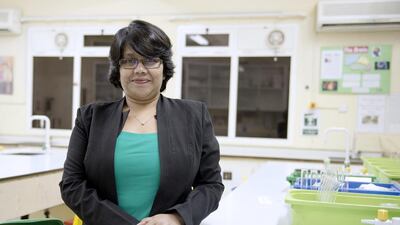ABU DHABI // Students vying for the chance to see their experiments blasted into space are having their "imagination and intellectual abilities stretched" as they push to be part of "something big", teachers have said.
With the deadline for the Genes in Space contest less than a week away, science teachers are helping pupils put the finishing touches to their ideas.
As part of The National Space Programme, the contest challenges high school pupils to develop an experiment that looks at the behaviour of DNA in the low gravity of Earth’s orbit.
The winning students will travel to the United States to watch their experiment launched to the International Space Station, to be conducted by astronauts.
Teachers mentoring high-school students said the process is teaching the youngsters valuable lessons.
Tharani Mallikarjunan, a biology teacher at the Cambridge High School in Abu Dhabi, said: “They have more belief in themselves and their ability to understand what they are capable of has grown significantly.”.
The teacher of A-levels said that sense of self confidence was evident in one of the usually more introverted students.
“He doesn’t have an outgoing personality and usually keeps to himself, but by the end he was ready to take over their promotion on social media.”
What surprised Ms Mallikarjunan the most was how much the project developed the pupils’ capacity to work together.
“Their collaboration and level of team work was impressive. Not one student stood above another.”
Ms Mallikarjunan’s four seniors decided to propose a study on the possible connections of microgravity and depression in humans, which could be of significance to astronauts’ psyche while in orbit.
The possibility of practical application is what excited her students the most.
“Even if they don’t win the prize, the process of discovery is what they are really interested in,” she said.
Sekkie van Eeden, the head of the science department at Cambridge High School, said he knew the students would be excited by Ms Mallikarjunan’s initial reaction when she heard about the contest.
“When the teacher gets that excited about something, you know it will have a ripple effect,” he said.
The fact that the competition offered a hands-on approach in the field of space science was key in motivating the students he said.
Incorporating empirical activities in science education as often as possible was key in helping students understand the subjects.
“This is when you really learn,” said Ms Mallikarjunan who integrates hands-on activities in her class every chance she gets.
The teacher said she hoped to see more competitions like it in the future.
“These contests stretch their imagination and intellectual abilities. We need more of them to give them a chance to feel they can be a part of something big.”
Pupils in Grades 7 to 12 can now submit their ideas for Genes in Space at genesinspace.org with the deadline being Thursday, February 11.
To find out more and to get involved, follow #theuaespacestory on social media.
tsubaihi@thenational.ae

